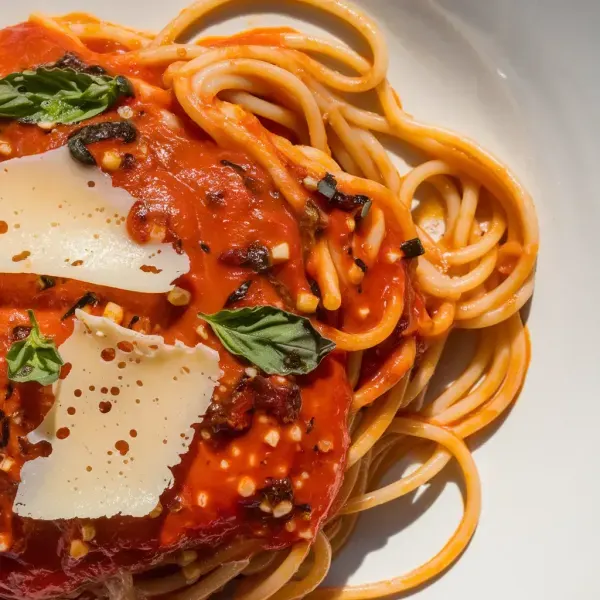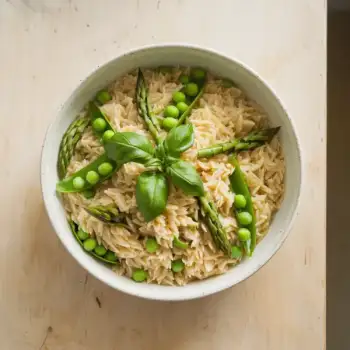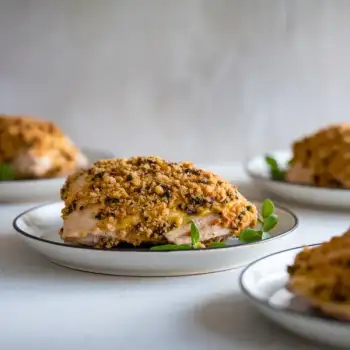
 30 minutes
30 minutesIndulge in this classic Spaghetti Arrabbiata, a fiery and robust dish that marries the heat of Calabrian chilies with the tang of San Marzano tomatoes. Finished with a generous helping of microplaned Pecorino and Parmesan, it's a simple yet deliciously bold meal for two.


0 oz
tablespoons
Crushed Calabrian Chili
tablespoons
Garlic, thinly sliced
cloves
tablespoons
San Marzano Tomatoes, crushed
cups
Basil, leaves picked and torn
sprigs
Pecorino, microplaned
cups
Parmesan, microplaned
cups
1. Boil Water
Bring a pot of salted water to a boil, using just enough water to cover the pasta by 1-2 inches. This will save you some time waiting for the water to boil and will also ensure that you have plenty of starch in the pasta water to help hold your emulsion (which is what makes restaurant pasta so good!). Add about two teaspoons of salt per quart of water, right before you're going to use it, as you don't want the water to reduce and become too salty. Once boiling, turn the heat to low and place a lid on the pot until you're ready to cook the pasta.
2. Sweat Aromatics
While waiting for the water to boil, place a large skillet over medium heat and add the olive oil. Once the oil is shimmering, add the garlic and Calabrian chili. Cook, stirring frequently, until the garlic is fragrant and just starting to take on a pale golden color. This usually takes about 2-3 minutes. Be cautious not to let the garlic brown, as this can introduce a bitter taste.
3. Deglaze
Add the white wine to the pan and let it reduce by about 80%, or until it is almost dry.
4. Add Tomato
Add the crushed San Marzano tomatoes to the skillet, stir to combine and add a pinch of salt. Allow the sauce to simmer gently for 15 minutes, which will meld the flavors and thicken the sauce slightly.
5. Cook Pasta
Return the water to a boil. Add the spaghetti and cook, stirring occasionally, until the pasta is about 95% cooked through. This is typically a minute less than the package instructions for al dente. The pasta will finish cooking in the sauce.
6. Sauce Pasta
Drain the pasta, saving about a cup of pasta water, and add the pasta to the pan with the sauce. Add about a quarter cup of pasta water to help emulsify the sauce and coat the pasta. Continue cooking the pasta in the sauce for an additional 1-2 minutes until the pasta is perfectly al dente and the sauce has thickened enough to cling to the strands.
7. Finishing Ingredients
Remove the skillet from the heat. Sprinkle the microplaned cheeses and the basil over the pasta and toss rapidly to combine. The residual heat will melt the cheese, creating a creamy and velvety sauce. If the sauce is too thick, a bit more pasta water can be added to adjust the consistency.
Start with a base of sautéed garlic (and onion, if desired) in olive oil. Add crushed tomatoes or passata and simmer to let the flavors meld. Season with salt, pepper, and a pinch of sugar if needed to balance acidity. Add herbs like basil or oregano, either towards the end of cooking for a fresher flavor or early for a more integrated taste.
Enhance the Core sauce with red pepper flakes to introduce a spicy kick characteristic of Arrabbiata. Finish with fresh parsley and a drizzle of extra virgin olive oil.
Similar to Arrabbiata, Fra Diavolo introduces more heat, often with a mixture of chili peppers. It also typically includes seafood like shrimp, mussels, or clams, which are sautéed or simmered in the sauce.
Start by rendering the fat from guanciale (cured pork cheek) or pancetta and using this as the base for the Core sauce. Add chili flakes and perhaps a splash of white wine, then finish with Pecorino Romano cheese.
To the Core sauce, add anchovies, capers, and olives for the salty and briny Puttanesca profile. Garlic is also essential here, and some recipes include a hint of chili for heat.




Comments (0)